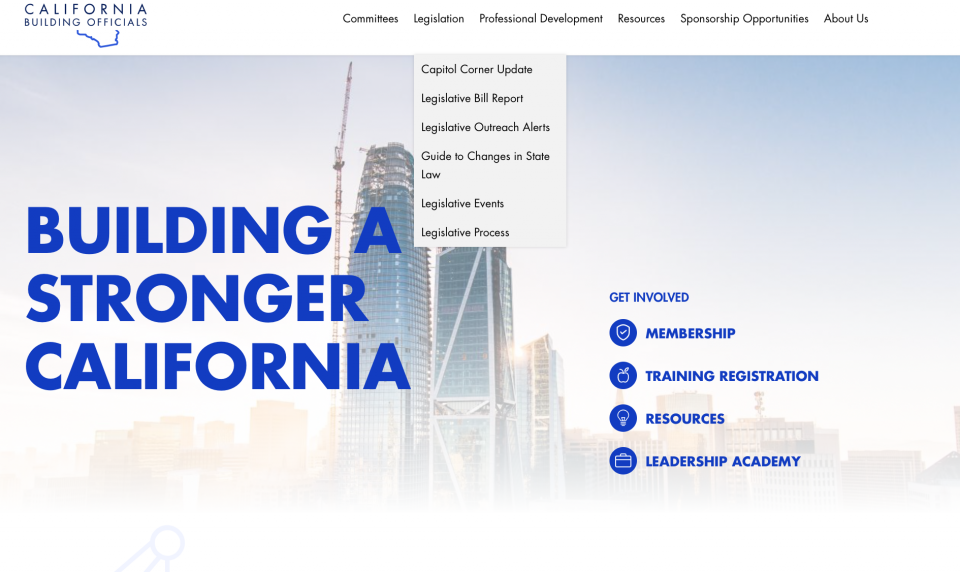Articles, Newsletters & Misc.
A Special Message from Your 2019-20 CALBO President
 Dear CALBO Friends and Colleagues,
Dear CALBO Friends and Colleagues,
With the code change upon us, I would like to highlight CALBO’s efforts to expand and refine training opportunities at the upcoming Annual Education Weeks this summer and fall.
The CALBO Training Institute (CTI) has worked tirelessly to have all courses updated for the 2019 Codes. A total of 17 new courses covering both code changes and professional development will be offered. There are 11 new instructors and course developers offering new insights and perspectives – thank you to allthe instructors and course developers for creating and delivering informative and practical training to our profession!
For the first time, the CALBO Training Institute will offer four Education Weeks:
August 26-29, 2019 – Newport Beach Marriott
September 9-12, 2019 – San Ramon Marriott
October 14-17, 2019 – DoubleTree by Hilton Hotel Ontario Airport
December 16-19, 2019 – Hyatt Regency San Francisco Airport (Burlingame)
In addition, Energy Code Ace will host the Lunch and Learn events at the Education Week: Newport Beach on Wednesday, August 28 and Education Week: Burlingame on Wednesday, December 18. This special lunch presentation is first-come, first-served covering the most commonly asked energy code questions using Energy Code Acetools and resources. This opportunity is not required; rather, it is offered to enhance learning opportunties outside of the classroom for students. A special thank you to Energy Code Ace for their sponsorship!
There will also be many opportunities to learn about industry products and services as over two dozen companies and organizations are participating in the Education Week Exhibitor Programs. Don’t forget to stop by the booths during the course breaks.
Let’s get ready to learn! Looking forward to seeing you at the Education Weeks over the next few months.
Sincerely,
Sharon Goei, P.E., C.B.O
Director of Building and Housing
City of Milpitas
Thank you to the following companies, agencies & organizations for their upcoming participation in the 2019 CALBO Education Weeks: Exhibitor Program!
The CALBO Training Institute hosts its Education Weeks throughout the Golden State to provide continuing education for California building departments. Dozens of state agencies, organizations, and companies participate by exhibiting in Newport Beach, San Ramon, Ontario and Burlingame. Please make the time to visit the participating exhibitors to learn more about up-to-date innovative products and services.
Stay Up-to-Date on all Legislative Issues
 Have you visited the Legislation tab on the CALBO Website? Take
advantage of these great resources for your jurisdiction:
Have you visited the Legislation tab on the CALBO Website? Take
advantage of these great resources for your jurisdiction:
- Legislative
Outreach Alerts
- Legislative Bill
Reports
- Online Bill Search Tool
- Capitol Corner
Update
- Legislative Events
- Legislative Process
and much more!
If you have any questions please contact Katie Little, CALBO’s Director of Public Affairs.
A Special Message from Your 2019-20 CALBO President
 Dear CALBO Friends and Colleagues,
Dear CALBO Friends and Colleagues,
One of the tasks this fall is the triennial adoption of the 2019 California Codes. To help everyone get ready for the new codes, CALBO is expanding training opportunities to four Education Weeks for the first time. Education Week registration is open and the 2019-2020 Annual Training Catalog has been published. I would like to thank the CALBO Training Institute Commission as well as the course developers and instructors for their tireless efforts to create and deliver practical and informative courses for building departments across the state. With this being a code change year, our goal is to have the four Education Weeks provide training that incorporates upcoming code changes to better meet the educational needs for building departments.
To promote the advancement of our building safety profession, International Code Council (ICC) and CALBO are collaborating on seismic resiliency by hosting a Seismic Roundtable at the State Capitol on July 25, 2019. Technical experts from across the country, including federal, state, and local agencies, will be discussing with ICC/CALBO members the development of a national approach to seismic functional recovery. This collaboration enables CALBO members to provide input that will shape this development effort going forward.
Also, at the State Capitol, CALBO has been actively communicating and working with the State Legislature on various bills, continually advocating for California’s building departments and promoting public safety in the built environment. We will provide updates in a future newsletter as the bills move further along in the legislative process.
Lastly, I would like to thank the local ICC Chapters for the hospitality at their recent joint meetings. I was honored to attend and provide CALBO activity updates at the Southern California regional meeting where the ICC Los Angeles Basin, Orange Empire, Ventura, Citrus Belt, Foothill, and High Desert Chapters came together to share their resources to further building-safety. At the Tri-Chapter meeting, the ICC East Bay, Monterey Bay, and Peninsula Chapters had a range of presentations that were timely preparation for the upcoming new codes. The great attendance and member engagement at these events once again demonstrate the commitment you have to ensuring public-safety for all of our communities – thank you for making a difference every day.
Enjoy your summer, because it will be a busy fall and winter!
Sincerely,
Sharon Goei, P.E., C.B.O
Director of Building and Housing
City of Milpitas
eCodes & Standards Libraries
Innovative Practices Committee
 Increasingly we are becoming an interconnected 24/7/365 world. We get our news on any device at anytime via Google (News), and research items via Wikipedia, YouTube, Instagram which now are our top dynamically updated content providers.
Increasingly we are becoming an interconnected 24/7/365 world. We get our news on any device at anytime via Google (News), and research items via Wikipedia, YouTube, Instagram which now are our top dynamically updated content providers.
The advent and maturing of the internet and cloud services likewise now make it possible for building officials including plan reviewers and inspectors with some services going beyond even the above capabilities. Today building officials have access anywhere, anytime 24/7/365 from several services building codes and standards which their jurisdiction has adopted and now enforce.
These services differ widely from those that provide only pdfs in down loadable files and to those providing even more useable access to codes and standards in a multiple formats further facilitating remote work.
One electronic codes and standards library system now is even affording some building departments the opportunity to have more of their plan reviewers work remotely enabling a jurisdiction’s building department to reduce the amount of office space. In other jurisdictions, this same service is enabling them to meet state laws mandating that they have access to EVERY standard referenced in their adopted codes – eliminating the space and cost of maintaining enormous physical libraries to comply with state law, something very small jurisdictions couldn’t otherwise afford to do.
